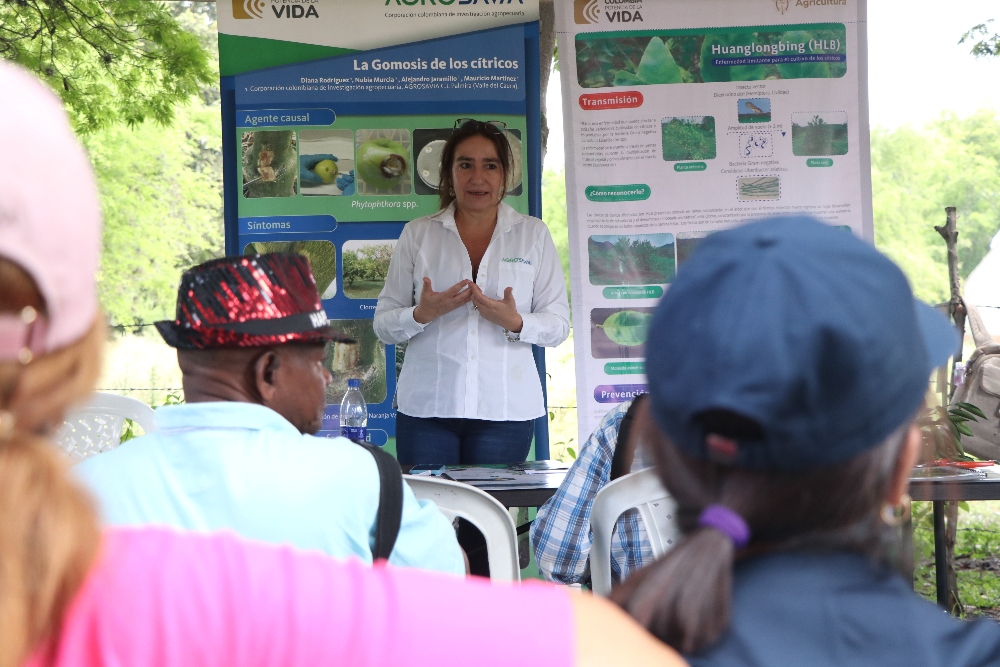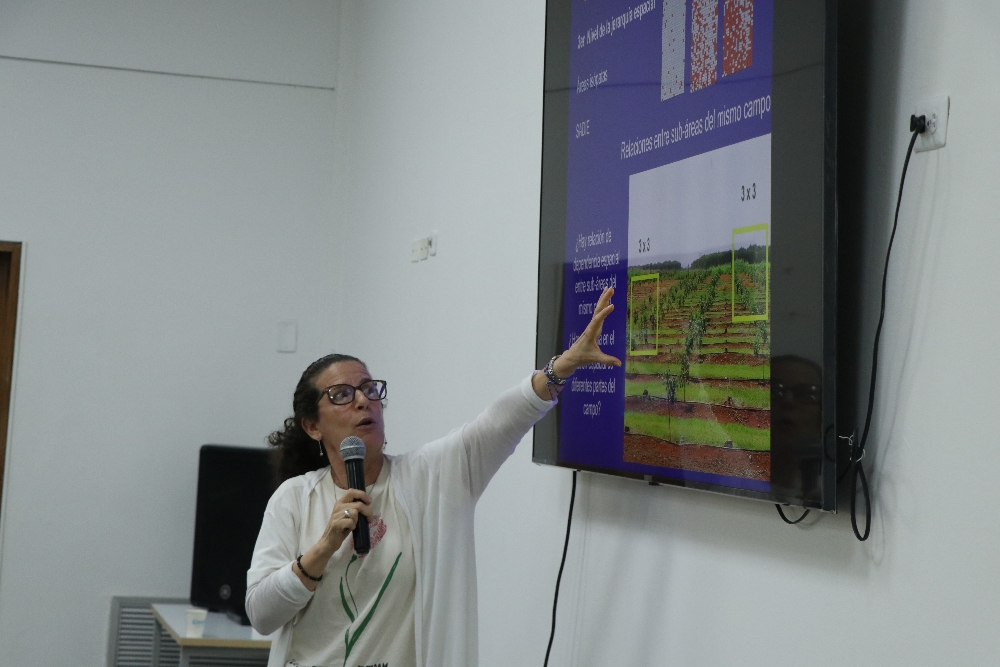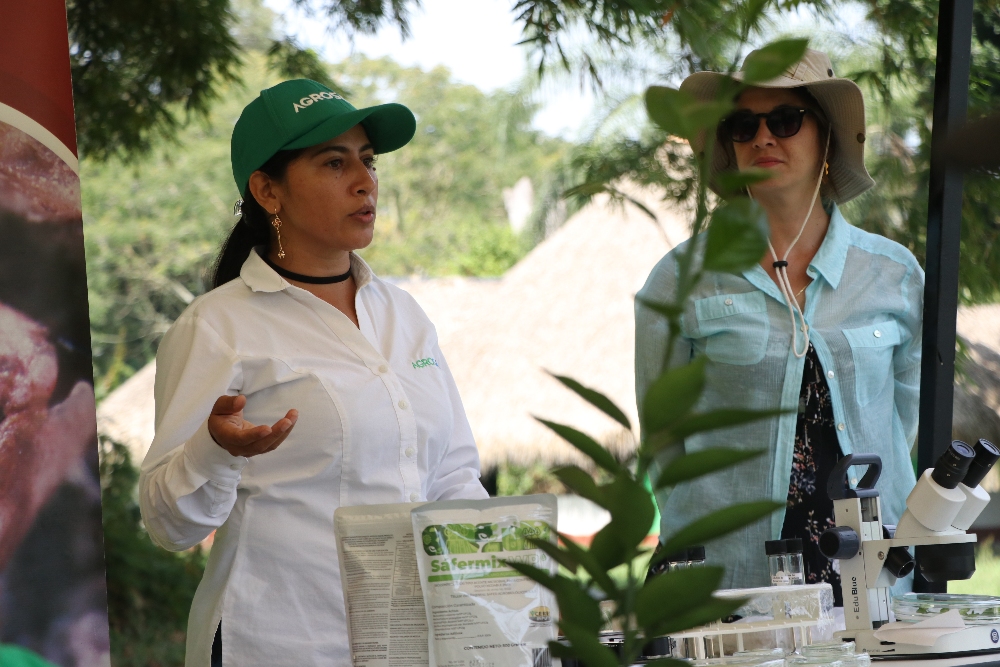Santa Marta, Magdalena. February 11, 2025. In the vast world of agriculture, where the sun caresses the fields and the wind carries the aroma of fruits, there is a silent threat that has put global citrus farming in check: Huanglongbing (HLB), a devastating disease caused by the Candidatus Liberibacter bacteria transmitted by vector insects, which has led to the eradication of more than 100 million trees worldwide.
It was first recorded in Latin America around 2004 in Sao Paulo (Brazil), and since then, its spread throughout the continent has not declined. In a study carried out in Mexico in 2010, losses of more than 14 million dollars (USD) were reported, and by 2015, the HLB disease had already arrived in Colombian territory after having spread throughout the Caribbean and the coasts of Florida in the United States.
Faced with this challenge, a team of female scientists from Colombia and Cuba have decided not to give up. Their fight is not only for plant health but for the future of citrus farming and food security for future generations.
Lumey Pérez Artiles, Ph.D. Researcher at the Caribia Research Center of Corporación colombiana de investigación agropecuaria - AGROSAVIA and leader of the project "Exchange of knowledge and strengthening of capacities in the citrus production system (INTERCÍTRICOS)," grew up on a farm in Villa Clara, Cuba, where she learned to read the signs of nature from her grandfather. Since she was a child, she has been fascinated by plants and insects, without imagining that this curiosity would make her a reference in the integrated management of pests and diseases in tropical fruit crops, especially against HLB.

The career of this Cuban, who arrived in Colombia in 2016, has been marked by challenges, from living far away from her family to the need to constantly demonstrate her worth in a sector historically dominated by men. However, her passion and determination for science and her unrestricted commitment to citrus farming have been stronger than any obstacle.
A similar case is that of her fellow countrywoman Lochy Batista Le Riverend, a passionate scientist whose work has marked a before and after in the phytopathology of citrus and other fruit trees on this Central American island. From her first steps in research, she faced the challenge of the Citrus Tristeza Virus, developing a key monoclonal antibody for its detection in Cuba. Thanks to this breakthrough, the country was able to effectively identify and combat the disease, laying the foundations for more robust plant health.

Nevertheless, her contribution did not stop there. Driven by her commitment to sustainable agriculture, Lochy has led pioneering research into the epidemiology of devastating diseases such as HLB, designing innovative crop protection strategies. Her work has been essential in the fight against these threats, promoting practices such as the elimination of infected plants and the control of insect vectors. Thanks to her tireless efforts, citrus production in Cuba and the region has found new hopes for sustainability and resilience.
Following in their footsteps is another Cuban, Maylín Rodríguez Rubial, a specialist at Instituto de Investigaciones en Fruticultura Tropical (IIFT) [Institute of Research in Tropical Fruit Growing] in Cuba, who has dedicated her life to studying the ecology and management of pests in fruit crops. Her work at INTERCÍTRICOS has been crucial to understanding the dynamics of the HLB insect vector and developing more effective control strategies. With her Caribbean accent, she points out that "in Cuba, more than 80% of the personnel working in agricultural science are women, and in her institute, more than 90% of the scientific team is composed of them." Her testimony reflects a reality that still needs greater recognition: women have been, and continue to be, the backbone of agricultural science in Latin America.

INTERCÍTRICOS is a project implemented by AGROSAVIA, IIFT, and ICA Spain and is funded by the tripartite mechanism of Triangular Cooperation, an alliance between APC Colombia, German Cooperation for Development – GIZ, and the European Union. Its objective is to strengthen the capacities for diagnosis, management, and control of diseases in citrus fruits through scientific exchange and international cooperation.
The multidisciplinary team of this project is composed mainly of women, among whom the Colombian researchers Nubia Murcia, Madeleyne Parra, and Luisa Fernanda Guzmán stand out. These women, with their knowledge and commitment, have made key contributions to transforming citrus farming in Colombia, implementing integrated pest management strategies, promoting the use of rootstocks, and training producers and technicians to improve the health of these crops in the country. Nubia, Madeleyne, and Luisa are agents of change, driving innovation through applied research, technology transfer, and international cooperation.
Women's work in science and technical studies in the agricultural field is fundamental. Not only do they contribute with new perspectives and comprehensive solutions, but they also play a crucial role in the dissemination of knowledge among producers. Their work strengthens family farming, improves the quality of life of rural communities, and empowers other women in the agricultural sector.
Despite the challenges, each of these scientists has shown that resilience is key in science. Lumey Pérez remembers the moments of uncertainty in her career, from living far away from her family to the need to make her way in a sometimes unequal environment. However, each obstacle has been an opportunity to reaffirm her commitment to agriculture and plant health. She emphasizes that "knowledge should not stay in laboratories but reach those who work the land every day."
On the International Day of Women and Girls in Science, we celebrate these guardians of citrus, the women who defy barriers and build a future where science, nature, and passion for knowledge go hand in hand. The true revolution in agriculture is taking place not only in laboratories or the fields but in every girl looking at these scientists and dreaming of discovering, researching, and changing the world.
- More information here:
- Daniel Mulford Soto
- Communications, Identity and Corporate Relations Professional
- Research Center Caribia
- Communications, Identity and Corporate Relations Advisory Office
- dmulford@agrosavia.co
- AGROSAVIA





